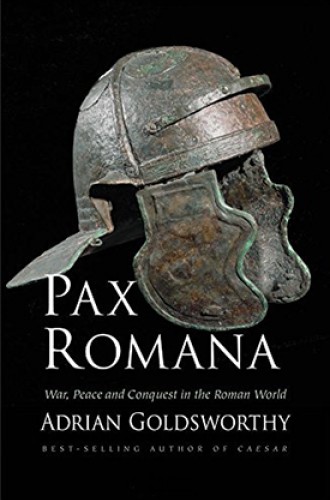What have the Romans ever done for us?
The aqueduct. The roads. An enforced peace to allow a young faith to spread.
A few years ago, I was visiting Rome for the umpteenth time and marveling at the city’s ancient aqueducts, public baths, paved roads, and sewer system. Swept up in the glories of these feats of technology that benefited the whole populace, I wrote a blog post suggesting that maybe, just maybe, empires aren’t all bad.
The online response was fast, furious, and vituperative. My friends to my ideological left were horrified that I could consider such a thing, much less make that opinion publicly known.
Adrian Goldsworthy acknowledges the same danger at the outset of his new history of Rome’s unparalleled expansion and centuries of relative peace (and dominance). Opening with a moving reflection on his own upbringing in World War II Britain, he then writes, “Even in the modern world peace is a rare and precious thing. If the Romans really did create conditions where most of the provinces lived in peace for long periods, then it is well worth studying this achievement.”
Read our latest issue or browse back issues.
The truth is, those of us who are involved in theology and ministry get most of our information about the Roman Empire through the lens of the New Testament writers based in first-century Palestine. That’s a bit like learning about the United States by reading the literature of Puerto Rico. As Goldsworthy notes, Judaea wasn’t even a true Roman province but an “equestrian province.” It didn’t even rate a Roman legion, hosting only military units raised from neighboring Samaria and the gentile population.
And that was a problem, because the internal strife in Judaea was among the worst in the empire: Jews hated Samaritans, Samaritans hated Jews, and they both hated gentiles. Constant civil conflict in the territory vexed the governing Romans, including a guy named Pontius Pilate.
Nevertheless, Rome kept the peace in Palestine as it did across a breathtakingly large empire: through a combination of laissez-faire government and military might. On the one hand, Roman governors were sensitive to local laws and customs. Goldsworthy quotes letters from the Emperor Trajan to his magistrate in Bithynia, Pliny the Younger, instructing him to rule in disputes according to Bithynian laws. Similarly, Rome left in place local religion, rulers, and even currency.
On the other hand, if locals got uppity—or worse, revolutionary—Roman force came down like a crushing hammer. The Jews learned this in 6–4 BC, and again in AD 70.
When Augustus, the first emperor, died in AD 14, he thought he had extended the empire as far as it could go. His successors disagreed. While the Italian peninsula remained the center of the empire, Gaul, Germanica, and many territories in the East were annexed. Only North Africa and Britain—both of which were lost several times during the republic and early empire—remained out of Rome’s command and control.
Any popular history of Rome these days stands in the shade of Mary Beard’s exciting and eminently readable SPQR, and Pax Romana is no exception. Goldsworthy is a fine writer, and he avoids getting bogged down in tedious details, but this book would be a challenge for someone not already knowledgeable about Roman history. The book’s outline is roughly historical, but Goldsworthy is more interested in themes than in chronology. This keeps the book from becoming pedantic.
Among these themes is warfare, something at which the Romans excelled. Goldsworthy also deftly handles issues like banditry, travel, and governance. Curiously, he pays almost no attention to the religious life of Rome and the provinces. This is unfortunate because allowing native religion to flourish was key to the success of the Pax Romana. The Romans were deeply religious—far more than the Greeks, for example—but they did not impose their religion on conquered lands.
What they did impose was the rule of law, and they did so by force. Goldsworthy notes that social and economic troubles in the Judaean countryside created “a desperate rural population willing to risk rebellion whenever strong leaders emerged.” But after a couple of unsuccessful uprisings, they learned their lesson. “Ultimately, the Jewish subjects of the Roman Empire accepted imperial rule and ceased to rebel.” Further, Goldsworthy notes, “even during the revolts, it does appear that as much or more of their hostility focused on non-Jewish neighbors rather than on the empire.”
By the middle of the first century, Paul’s letters were traveling along Roman roads. So was Paul himself. The religion he preached caught on particularly among Roman soldiers, who were professional, well-paid, well-traveled, and probably numbered 250,000 by that time. The same legionaries who kept the Roman peace also spread the Christian faith.
As we know from Paul’s own testimony, his status as a Roman citizen not only prolonged his life and helped him avoid various tortures but meant he could continue to preach and write while under house arrest by Marcus Antonius Felix, the governor of Judaea (see Acts 24). For Paul at least, it was good to be a Roman.
In the end, for all our ambivalence about the Roman Empire, it’s hard to imagine Christianity spreading as it did without the Pax Romana.






